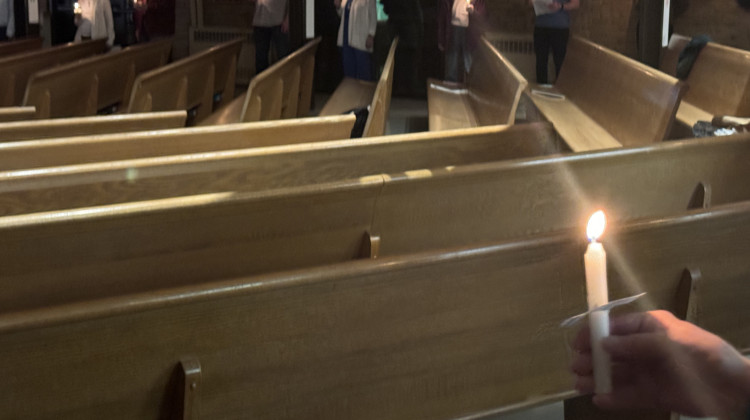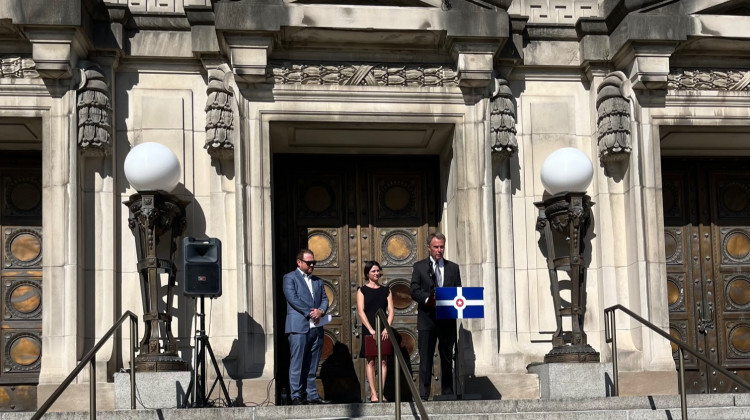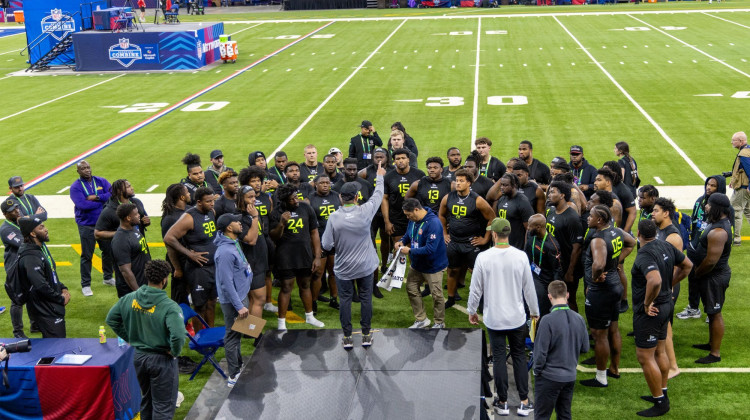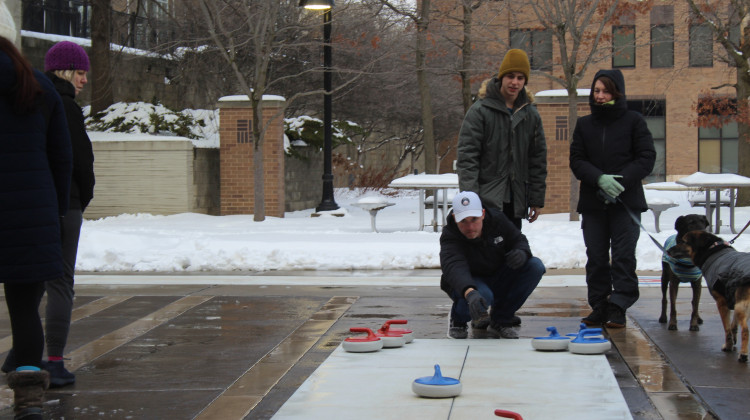
People gathered at All Souls Unitarian Church on election night, for a candlelight vigil for anyone feeling anxious or afraid.
Sam Horton / WFYITwo days following the 2024 Election, eight people sat in a circle at the Broadway United Methodist Church in Indianapolis.
There was scripture reading, singing, lighting of candles, and discussion about the election results.
At one point Senior Pastor Aaron Hobbs got up and shut the doors and windows. He instructed everyone to take a deep breath, in and out, followed by another. The third time, he told everyone to let out a scream.
“Sometimes just having that visceral reaction of getting all that out just makes you feel a little bit better,” Hobbs said. He was inspired to do a primal scream of prayer after seeing a church in New York do it the night before.
“It reminds us that we all are in this together and that we can make it through if we just are with each other and care for one another,” he said.
The election brought mixed emotions from Americans — happy, sad, confused. Some have turned to their religious leaders to help find comfort.
Carol Neufrauman first came to the church after 9/11 looking for support. She said the post-election vigil was another chance for the community to come together.
“I went through so many different emotions during this hour, and it really helped me to move through anger and grief and to come to a place of hopefulness and knowing I wasn't alone,” Neufrauman said.
Hobbs said he sees his role as a religious leader to be there for people, and create a space for them to process and share their viewpoints on issues.
“Part of being a good neighbor is always being open to having conversations and providing space when there’s difficult times in the community,” Hobbs said.
Senior Pastor Duane Carlisle with the First Methodist Church of West Lafayette said he had a number of first time attendees following the election.
“What I have seen is enough evidence of people who are really concerned, who need a faith community, and who need human contact and being around other people in groups,” Carlisle said.
Carlisle is also a part of We All Belong Greater Lafayette, a group that promotes religious freedom and democracy. The night before the general election the group hosted an interfaith gathering of Christians, Jews and Muslims to seek peace and fellowship.
“We need the shared wisdom and the ability to dialogue about what is essential and what's important, and how do we allow everyone in our communities to thrive, not only certain people, but everyone, because there is a place for everyone,” Carlisle said.
The election results showed the deep divisions happening in the country and in Indiana communities. The economy, immigration and democracy were some of the most important issues for voters.
President-elect Donald Trump won not only the Electoral College, but also the popular vote against Kamala Harris. In Marion County, Harris won 62 percent of the vote, Trump received 35 percent. In Tippecanoe County, the votes were almost evenly split with Trump getting just 100 more votes than Harris.
“We've seen that our communities have mirrored, in some ways, the divisions happening in the country,” said Rabbi Brett Krichiver, senior rabbi at the Indianapolis Hebrew Congregation.
“We have people in our congregation who are excited about the election,” Krichiver said. “We have a large number of people in our community who are devastated and scared about the election.”
Krichiver said he sees his role now to be there for those needing support, but also bringing people together on different sides.
“I think our role is to comfort those who are feeling so scared, and to allow us to form a collective voice to express that fear and that anger, but also to allow people who are excited about the election to feel like this is their spiritual home as well,” Krichiver said.
People came and went from Masjid Al-Fajr, a mosque on the west side of Indianapolis, on the Friday afternoon following the election. Sitting in his office, Imam Ahmed Alamine said he saw a split in Muslim voters supporting Democrats, Republicans and third-party candidates in this year’s election.
Alamine sees his role as a religious leader to be unbiased in politics, but said he does counsel individuals to look to the future.
"I tell people, you know, go back to be neighbors, go back to be family, go back to be friends," Alamine said. "We cannot just keep this tension and polarization going. And fortunately, a lot of community members are listening."
Alamine said over the next few months the Friday service sermon will focus on bringing unity back into the community.
“We will do everything we can to serve as faith leaders to bring this tension down and give hope to people in the time of hopelessness,” he said.
Contact WFYI All Things Considered newscaster and reporter Samantha Horton at shorton@wfyi.org.
 DONATE
DONATE






 Support WFYI. We can't do it without you.
Support WFYI. We can't do it without you.